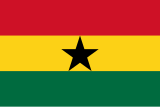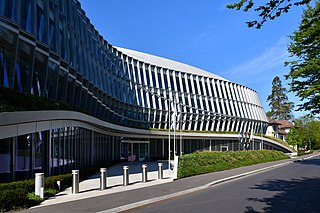
The International Olympic Committee is a non-governmental sports organisation based in Lausanne, Switzerland.

The modern Olympic Games or Olympics are the leading international sporting events featuring summer and winter sports competitions in which thousands of athletes from around the world participate in a variety of competitions. The Olympic Games are considered the world's foremost sports competition with more than 200 teams, representing sovereign states and territories participating; by default the Games generally substitute for any World Championships the year in which they take place. The Olympic Games are held every four years; since 1994, they have been alternated between the Summer and Winter Olympics every two years during the four-year period.
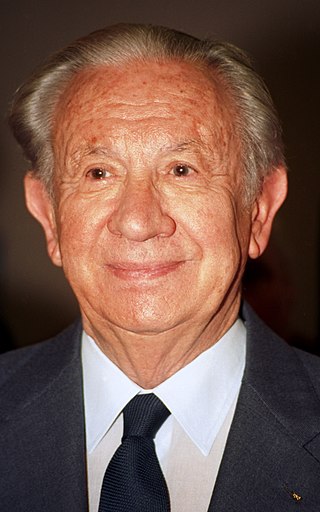
Juan Antonio Samaranch y Torelló, 1st Marquess of Samaranch was a Spanish sports administrator under the Franco regime (1973–1977) who served as the seventh President of the International Olympic Committee (IOC) from 1980 to 2001.

Jacques Jean Marie Rogge, Count Rogge was a Belgian sports administrator and physician, who served as the 8th President of the International Olympic Committee (IOC) from 2001 to 2013. In 2013, Rogge became the IOC's Honorary President, a lifetime position, which he held until his death from Parkinson's disease in August 2021.

Michael Morris, 3rd Baron Killanin, was an Irish journalist, author, sports official, and the sixth President of the International Olympic Committee (IOC). He succeeded his uncle as Baron Killanin in the Peerage of the United Kingdom in 1927, when he was 12, which allowed him to sit in the House of Lords at the Palace of Westminster as Lord Killanin upon turning 21.

Avery Brundage was an American sports administrator who served as the fifth president of the International Olympic Committee from 1952 to 1972. The only American and only non-European to attain that position, Brundage is remembered as a zealous advocate of amateurism and for his involvement with the 1936 and 1972 Summer Olympics, both held in Germany.

Henri de Baillet-Latour, Count of Baillet-Latour was a Belgian aristocrat and the third president of the International Olympic Committee (IOC).

The 117th International Olympic Committee Session was held for the first time in Singapore from 2 to 9 July 2005. Two important decisions were made through voting during the session – namely the selection of the hosting city for the 2012 Summer Olympics, and a review of the 28 sports currently represented in the summer games.
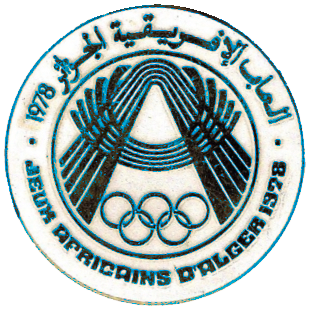
The 3rd All-Africa Games – Algiers 1978 was a multi-sport event played from July 13, 1978, to July 28, 1978, in Algiers, Algeria. 45 countries from 49 independent African countries participated in twelve sports.

The Olympic Order, established in 1975, is the highest award of the Olympic Movement. It is awarded for particularly distinguished contributions to the Olympic Movement, i.e. recognition of efforts worthy of merit in the cause of sport. Traditionally, the IOC bestows the Olympic Order upon the chief national organiser(s) at the closing ceremony of each respective Olympic Games.
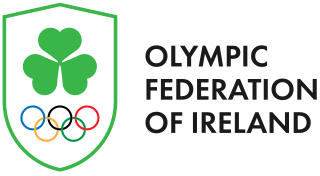
The Olympic Federation of Ireland or OFI is the National Olympic Committee (NOC) of Ireland. Athletes from Northern Ireland have the option of participating under its auspices or in the Great Britain Olympic Team. Its mission statement is "To manage and enhance the performance of Team Ireland at Olympic Games whilst developing the Olympic Movement in Ireland." In 2018 the Olympic Council of Ireland was renamed as the Olympic Federation of Ireland.

The Olympic Committee of Portugal is a non-profit organisation of public utility, which serves as the National Olympic Committee (NOC) for Portugal. It was founded on October 26, 1909, to ensure a timely, methodical and state-sponsored participation at the Games of the V Olympiad, in Stockholm. Thus, it was the 13th nation to join the Olympic Movement.

The closing ceremony of the 2004 Summer Olympics was held on 29 August 2004 21:15 EEST (UTC+3) at the Olympic Stadium, in Marousi, Greece, a suburb of Athens.
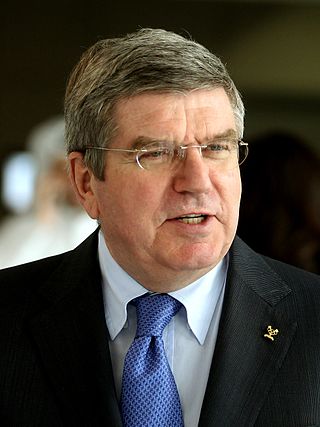
The president of the International Olympic Committee is head of the executive board that assumes the general overall responsibility for the administration of the International Olympic Committee (IOC) and the management of its affairs. The IOC Executive Board consists of the president, four vice-presidents, and ten other IOC members; all of the board members are elected by the IOC Session, using a secret ballot, by a majority vote.
South Africa did not compete at Olympic Games from 1964 to 1988, as a part of the sporting boycott of South Africa during the apartheid era. The South African National Olympic Committee (NOC) was expelled from the International Olympic Committee (IOC) in 1970. In 1991, as part of the transition to multiracial equality, a new NOC was formed and admitted to the IOC, and the country competed at the 1992 Summer Olympics held in Barcelona.

International Olympic Committee Athletes' Commission is a majority elected body that serves as a link between athletes and the IOC. The mission of the IOC AC is to ensure that athletes' viewpoint remains at the heart of the Olympic Movement decisions, representing future, current and recently retired Olympic athletes. The IOC AC aims to provide athletes with a platform to share their voice and experiences, and be part of change and decisions shaping the future of sport.
The closing ceremony of the 1984 Summer Olympics took place at the Los Angeles Memorial Coliseum in Los Angeles, California on Sunday, August 12, 1984, at 20:00 PDT.
Charles Osei Asibey "The Barrister" is the President of the Africa Armwrestling Federation and the Vice President of the World Armwrestling Federation. He was voted into office as the President of the Federation in July 2022. He is a retired broadcast journalist who is also the founder and current President of the Ghana Armwrestling Federation. He also doubles as the General Secretary of the Sports Writers Association of Ghana (SWAG). He is also the former Communications Director for the Ghana Olympic Committee.
A Tripartite Commission is the name given to one of a number of commissions within the Olympic movement, consisting of representatives of (1) the International Olympic Committee ("IOC"), (2) one or more international sports federations ("IFs"), and (3) one or more National Olympic Committees ("NOCs"). Currently, Tripartite Commissions are primarily used to select athletes to be invited to compete at the Olympic Games through special invitational quota places intended to improve universality.
The 143rd IOC Session is an upcoming IOC Session scheduled to be held in Athens, Greece in 2025. At this session, the tenth President of the International Olympic Committee will be elected. Athens was originally selected to host the 137th IOC Session that was due to take place in 2021, however, the COVID-19 pandemic and travel restrictions altered to hold the session virtually.

















